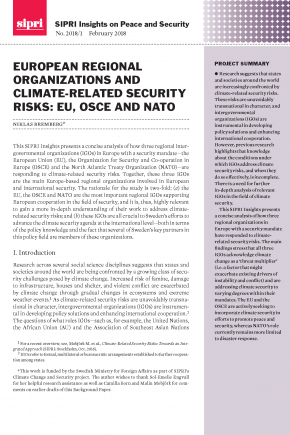European Regional Organizations and Climate-related Security Risks: EU, OSCE and NATO
Research suggests that states and societies around the world are increasingly confronted by climate-related security risks. These risks are unavoidably transnational in character, and intergovernmental organizations (IGOs) are instrumental in developing policy solutions and enhancing international cooperation. However, previous research highlights that knowledge about the conditions under which IGOs address climate security risks, and when they do so effectively, is incomplete. There is a need for further in-depth analysis of relevant IGOs in the field of climate security.
This SIPRI Insights presents a concise analysis of how three regional organizations in Europe with a security mandate have responded to climate-related security risks. The main findings stress that all three IGOs acknowledge climate change as a ‘threat multiplier’ (i.e. a factor that might exacerbate existing drivers of instability and conflict) and are addressing climate security to varying degrees within their mandates. The EU and the OSCE are actively seeking to incorporate climate security in efforts to promote peace and security, whereas NATO’s role currently remains more limited to disaster response.
I. Introduction
II. The EU: Developing a comprehensive approach to climate-related security risks
III. The OSCE: Bridging environmental and climate security
IV. NATO: The prevalence of traditional security concerns
V. Implications for future research and policy

